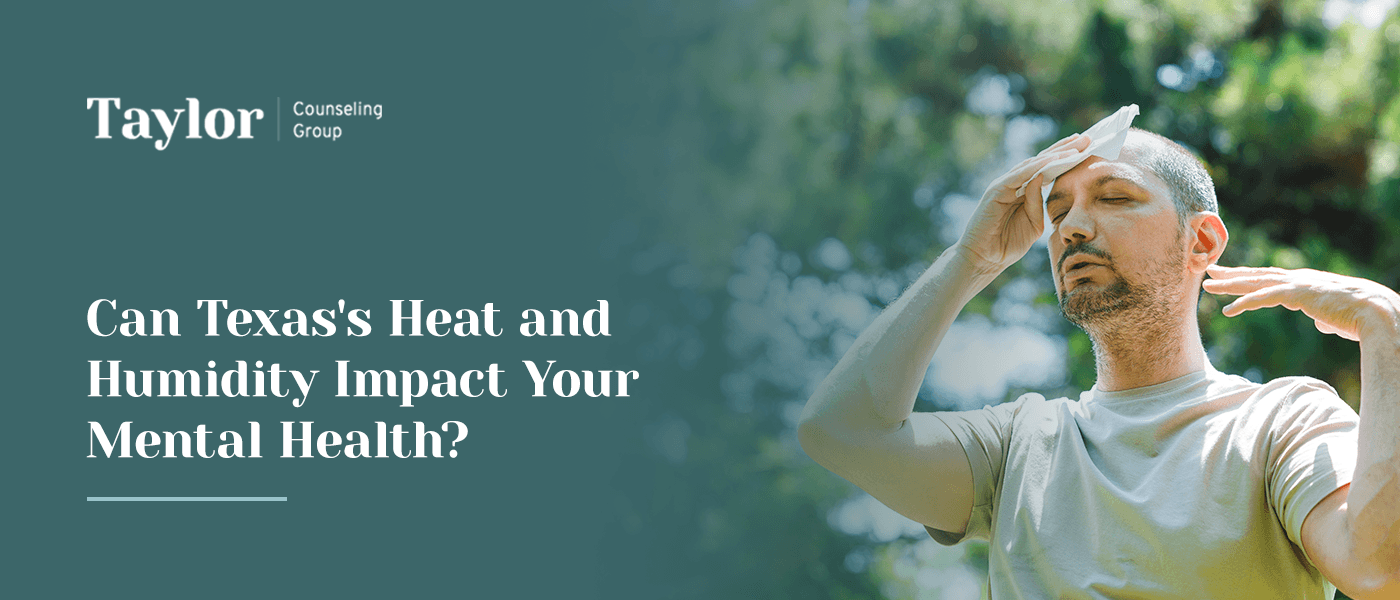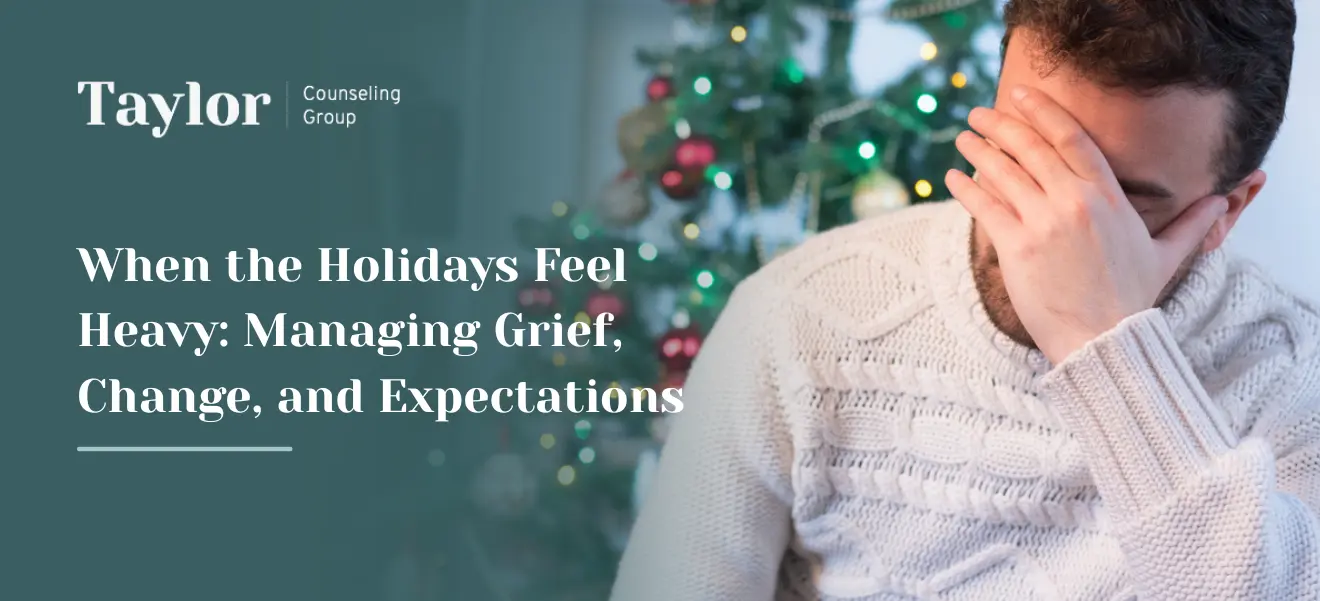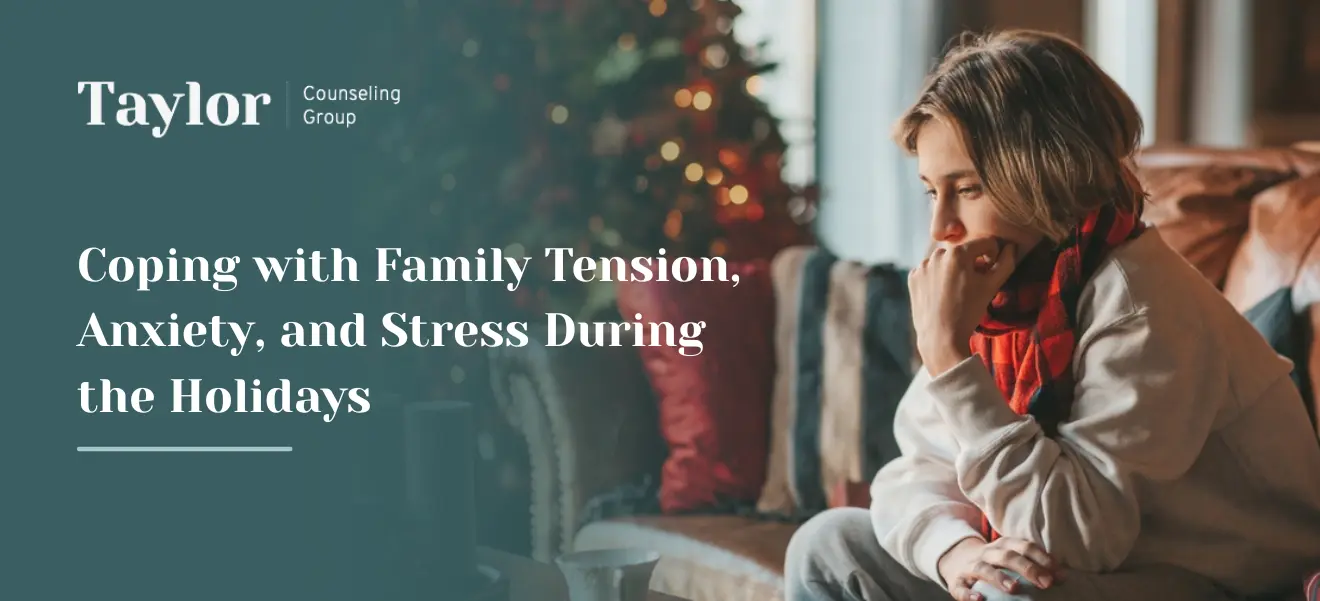Can Texas’s Heat and Humidity Impact Your Mental Health?
There’s a stereotype that cold, rainy weather is “miserable.” However, the opposite is true for many people battling the Texas heat this summer, with rising temperatures and muggy air sometimes triggering distressing emotions. In this article, we’ll explore how weather impacts mental health, why unrelenting heat can make you feel anxious, irritable and even depressed, and what to do when you feel overwhelmed by heat stress.
How Does Weather Impact Mental Health?
If you feel your mood is strongly tied to the weather, you may very well be right. Higher temperatures play a significant role in your psychological well-being, especially in the context of climate change. Scientists are rigorously researching the relationship between hotter weather and mental-health-related hospital visits, and some studies have found that more people visit hospitals for mental health concerns during temperature spikes.
Does Hot Weather Cause Anxiety?
Heat can induce anxiety in people new to hot weather and those who’ve dealt with it for years, especially when paired with unparalleled Texas humidity. In the Lone Star State specifically, heat is a growing cause of anxiety, with the state hitting record-high temperatures in 2023 — the hottest year in over a century. Psychological effects of intense heat can include:
1. Feelings of Claustrophobia and Panic
When it’s hot and humid at the same time, your body can’t properly cool itself down using transpiration because there’s too much moisture in the air. Fans are less effective when it’s very humid, so you may feel agitated or even have an anxiety or panic attack as you struggle to cool yourself down. This overheating phenomenon is called heat stress.
People can be more susceptible to heat stress in extreme humidity due to factors like:
- Being over 60 years old
- Taking antidepressants
- Using psychoactive substances
- Taking medication that alters vasodilation
- Being acutely or chronically ill
- Having excess weight
If the air around you is uncomfortably hot, your body produces more cortisol, the hormone responsible for the fight-or-flight response. Cortisol raises your body temperature via adrenaline, making you even hotter. This see-saw of heat and stress creates a feedback loop that can feel very overwhelming and interfere with your daily life.
2. Overstimulation and Frustration
Although we usually think of humans as having five senses, we actually have several more. One of these senses is the ability to detect temperature. People prone to sensory overstimulation, such as neurodivergent people with autism spectrum disorder (ASD) or attention deficit hyperactivity disorder (ADHD), and highly sensitive people may struggle to deal with hotter temperatures, especially the extreme Texas heat.
3. Heat Triggering Existing Mental Illnesses
While living with mental illness takes bravery and resilience at the best of times, rising temperatures add an extra challenge. Studies have shown that exposure to uncomfortably hot weather over long periods of time makes coping with preexisting mental illnesses more challenging. People with mood disorders, anxiety disorders, schizophrenia, post-traumatic stress syndrome (PTSD) and suicidal ideation are at higher risk during heat waves.
Can the Heat in Texas Cause Depression?
If the summer heat makes you depressed, you’re not alone. Depression can happen for various reasons, including prolonged windows of anxiety, isolation, stress, illness and environmental changes — all of which can be triggered by intense heat. A study published in 2024 has found strong links between higher body temperature and the severity of depression symptoms. Heat waves can cause depression in the following ways:
Seasonal Depression in the Summer
Seasonal affective disorder (SAD) happens when people feel depression symptoms in certain months of the year, recurring in cycles. The condition is commonly associated with the winter blues, although many people do experience SAD in the summertime, known as “summer-pattern SAD.” Symptoms of summer-pattern SAD can include:
- Insomnia
- Appetite loss
- Weight loss
- Restlessness
- Agitation
- Anxiety
- Aggression
SAD has been linked to disruption in melatonin, the hormone that helps you sleep and balances your circadian rhythm. You may struggle to adapt to seasonal light and temperature changes, affecting your mood, behavior and sleep quality.
Climate Change Concerns
People are experiencing climate change anxiety all over the world, sometimes leading to depressive symptoms like hopelessness and grief. The record-breaking temperatures Texas has experienced remind residents of climate change’s current and future challenges. This is especially true for environmentally conscious people and those with frequent exposure to information on how climate change is worsening.
Does Heat Worsen Substance and Alcohol Use?
Research has found that more people are admitted to hospital for excessive alcohol use during exceptionally hot conditions and for substance use in hotter-than-normal conditions. These findings are particularly worrying as drinking alcohol and using substances — particularly stimulants — can raise your internal temperature and dehydrate you.
Is the Texas Heat Making People More Irritable?
Irritability and aggression spike during heat waves, according to research. People tend to interpret interactions as more hostile when the ambient temperature is uncomfortably high. Tempers are more easily flared, leading to more violent crimes on hotter days, according to researchers.
How Can You Deal With the Summer Heat in Texas?
Now that science has corroborated the effect of extreme heat on mental health, scientists are working on ways to help people through hot weather and protect their well-being. Some steps you can take to help prevent anxiety, depression and aggression triggered by high temperatures include:
1. Keeping Yourself Hydrated
When it’s hot, it’s good to perspire. It’s your body’s way of cooling itself down. However, when you sweat, you lose water and electrolytes — primarily sodium. Harvard Health recommends drinking four to six cups of water daily to prevent dehydration and preserve mental clarity. Depending on factors like age, activity levels and illnesses, you may need more or less. Speak to your doctor about your unique hydration requirements and replacing crucial electrolytes.
2. Staying Inside During Heat Waves
Stay out of direct sunlight and shelter inside when it’s very hot outside. Houses and buildings in the United States are usually insulated to keep colder air in and warmer air out. They are often kitted out with air conditioners — your best friends during heat waves. If your home isn’t optimized for cooling, consider visiting libraries, shopping malls, gyms, community centers and cafes for some respite.
3. Wearing Breathable Clothing
Tight, dense fabrics can trap body heat and prevent you from sweating. Instead, wear loose-fitting, light clothing made from linen, hemp and cotton and pack the leather, wool and synthetic fabrics away for chillier days. That way, air can pass over you skin and encourage water to evaporate, cooling you down.
4. Giving Your Body a Rest
Skip your daily neighborhood jog, reschedule soccer practice and take a raincheck on Saturday night clubbing when the weather is humid and hot. You want to preserve energy, keep your internal temperature down, relax your mind, and stay hydrated. A nice cold beverage, a cool room, a good book and the occasional cold shower can do wonders for your mood.
5. Getting Individual Counselling
If the heat’s intensity feels too much, there is hope, and you are not alone. For support and guidance through the psychological challenge of extreme heat, reach out and speak to a counselor or therapist in your area. They’ll work with you to discover your potential triggers, helping you develop coping strategies and building your resilience.
Schedule An Appointment Online Today
Why Trust Us to Support Your Mental Health?
At Taylor Counselling Group, we’re committed to accessible, reliable, cost-effective mental health care for Texas’s diverse, deserving community. Our team of professional, friendly counselors and therapists offers various therapeutic modalities and welcomes clients from all walks of life. We believe in full-spectrum mental health care, so our specialties are broad — from help with stress management and coping with pain to identity development and grief counseling.
Since 2015, Taylor Counselling Group has established 12 locations across Texas to meet the growing need for mental health care. In 2020, we partnered with the award-winning public awareness campaign Okay to Say, an initiative dedicated to reducing the taboo around asking for help. For every session we hold, we donate $1 to Okay to Say’s mission to destigmatize conversations surrounding mental health.
Find Your Safe Space With Taylor Consulting Group
We’d love to help you through life’s complex challenges, from the anxieties of Texas summer heat to any other mental health concern weighing on your heart. Reach out and schedule an appointment with us today.






